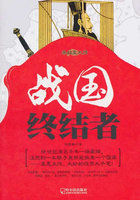With the thronging of many sorts of people, in parties and singly, into the waiting room, they became once again mere observers of their kind, more or less critical in temper, until the crowd grew so that individual traits were merged in the character of multitude. Even then, they could catch glimpses of faces so sweet or fine that they made themselves felt like moments of repose in the tumult, and here and there was something so grotesque in dress of manner that it showed distinct from the rest. The ticket-seller's stamp clicked incessantly as he sold tickets to all points South and West: to New York, Philadelphia, Charleston; to New Orleans, Chicago, Omaha; to St. Paul, Duluth, St. Louis; and it would not have been hard to find in that anxious bustle, that unsmiling eagerness, an image of the whole busy affair of life. It was not a particularly sane spectacle, that impatience to be off to some place that lay not only in the distance, but also in the future--to which no line of road carries you with absolute certainty across an interval of time full of every imaginable chance and influence. It is easy enough to buy a ticket to Cincinnati, but it is somewhat harder to arrive there. Say that all goes well, is it exactly you who arrive?
In the midst of the disquiet there entered at last an old woman, so very infirm that she had to be upheld on either hand by her husband and the hackman who had brought them, while a young girl went before with shawls and pillows which she arranged upon the seat. There the invalid lay down, and turned towards the crowd a white, suffering face, which was yet so heavenly meek and peaceful that it comforted whoever looked at it.
In spirit our happy friends bowed themselves before it and owned that there was something better than happiness in it.
"What is it like, Isabel?"
"O, I don't know, darling," she said; but she thought, "Perhaps it is like some blessed sorrow that takes us out of this prison of a world, and sets us free of our every-day hates and desires, our aims, our fears. ourselves. Maybe a long and mortal sickness might come to wear such a face in one of us two, and the other could see it, and not regret the poor mask of youth and pretty looks that had fallen away."
She rose and went over to the sick woman, on whose face beamed a tender smile, as Isabel spoke to her. A chord thrilled in two lives hitherto unknown to each other; but what was said Basil would not ask when the invalid had taken Isabel's hand between her own, as for adieu, and she came back to his side with swimming eyes. Perhaps his wife could have given no good reason for her emotion, if he had asked it. But it made her very sweet and dear to him; and I suppose that when a tolerably unselfish man is once secure of a woman's love, he is ordinarily more affected by her compassion and tenderness for other objects than by her feelings towards himself. He likes well enough to think, "She loves me," but still better, "How kind and good she is!"
They lost sight of the invalid in the hurry of getting places on the cars, and they never saw her again. The man at the wicket-gate leading to the train had thrown it up, and the people were pressing furiously through as if their lives hung upon the chance of instant passage. Basil had secured his ticket for the sleeping-car, and so he and Isabel stood aside and watched the tumult. When the rash was over they passed through, and as they walked up and down the platform beside the train, "I was thinking," said Isabel, "after I spoke to that poor old lady, of what Clara Williams says: that she wonders the happiest women in the world can look each other in the face without bursting into tears, their happiness is so unreasonable, and so built upon and hedged about with misery. She declares that there's nothing so sad to her as a bride, unless it's a young mother, or a little girl growing up in the innocent gayety of her heart. She wonders they can live through it."
"Clara is very much of a reformer, and would make an end of all of us men, I suppose,--except her father, who supports her in the leisure that enables her to do her deep thinking. She little knows what we poor fellows have to suffer, and how often we break down in business hours, and sob upon one another's necks. Did that old lady talk to you in the same strain?"
"O no! she spoke very calmly of her sickness, and said she had lived a blessed life. Perhaps it was that made me shed those few small tears.
She seemed a very religious person."
"Yes," said Basil, "it is almost a pity that religion is going out. But then you are to have the franchise."
"All aboard!"















